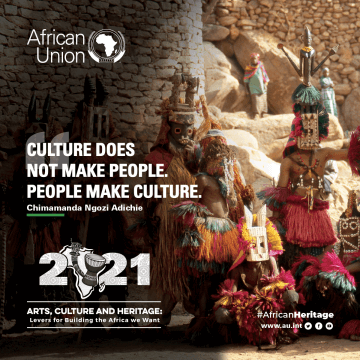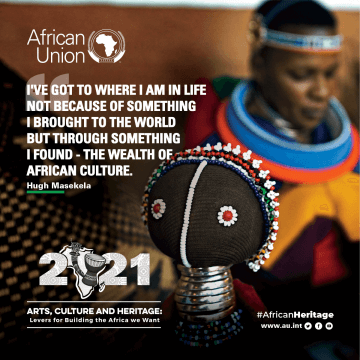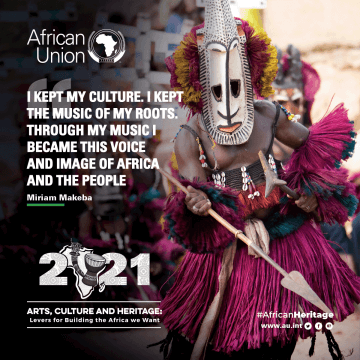Opening Statement For H.E Amira Elfadil, Commisioner For Social Affairs During The Ministerial Session Of The 5th Pan-African Forum On Migration (PAFOM 5)
OPENING STATEMENT FOR H.E AMIRA ELFADIL, COMMISIONER FOR SOCIAL AFFAIRS DURING THE MINISTERIAL SESSION OF THE 5th PAN-AFRICAN FORUM ON MIGRATION (PAFoM 5) 16 September 2019; Sofitel Hotel, Cairo, EgyptYour Excellencies. Distinguished Guests. Ladies and Gentlemen.It is my Privilege and honor s to welcome all of you to the 5th Pan African Forum on Migration (PAFOM) that is being held in Cairo, Egypt under the Theme: “Strengthening Migration Data and Research for evidence-based policy development and implementation towards effective migration governance in Africa”. . I wish to thank the Government of Arab Republic of Egypt for their warm reception and hospitality not only to me but also to all the delegates attending the PAFOM. May I also take this opportunity to thank Experts who kickstarted this meeting two days ago and of course our warm welcome goes to all the Honorable Ministers here present from Member States, and other Heads of Delegation for demonstrating commitment to Migration policy issues, demonstrated by your physical presence in the 5th PAFOM. Your Excellencies. Distinguished Guests. Ladies and GentlemenThe Pan African Forum on Migration (PAFOM) is increasingly becoming a key platform in which AU Member States, RECs and other stakeholders meet to share information, learn from one another and also leverage the opportunity to meet and interact with non- state actors participants with a view of building a common understanding and reaffirm shared values on the AU migration Agenda towards an integrated, prosperous and peaceful Africa. The Forum has been a main continental Interstate platform where Member States and other key stakeholders meet to deliberate on topical migration agenda affecting the continent. It is very satisfying for me to note that finally we have a regular annual forum that provides us with the opportunity interact, share best practices and also keep abreast on what is happening at national, regional, continental and international arena on migration governance. It is also worth noting that PAFOM has been able to identify help us build a common understanding on the most issues of migration and human mobility within the continent and has contributed greatly in providing initial thoughts toward the development of the Common African Positions in issues of migration.Your Excellencies. Distinguished Guests. Ladies and GentlemenAs a Commission, together with partners, we are looking forward to strengthening this platform to respond to AU Member States and RECs needs in improving migration governance in the continent. I am happy to note that the senior officials meeting of the Forum has validated the proposed Draft Terms of Reference and provided useful input to them. As proposed in the meeting, the Draft TORs will be submitted to the upcoming Specialized Technical Committee (STC) on Migration, Refugees and IDPs, for validation and adoption. Once validated by this AU decision making organ, it will go a long way in elevating PAFOM as a premier continental dialogue platform that provides synergies and linkages with national and regional interstate consultative processes. It will also provide a clear leadership and ownership opportunity by Member States and all stakeholders through defined predictable levels of participation, hosting criteria, funding of this forum, among other issues. Further, there is need for the forum to be synchronized with political decision-making structures of the African Union. As such, for the first time in the history of the PAFOM, we have invited relevant Ministers to participate during the 3-day meeting of the Forum. The Commission believes that through the Ministerial participation, the recommendations of this and future meetings will have the relevant support by our highest political decision makers. The outcome report will also be submitted to the upcoming Specialized Technical Committee of Migration, Refugees and IDPs which is the AU statutory Ministerial meeting for their validation. As such, the Department of Social Affairs in the Commission is keen to support this forum, to ensure the forum is a success in line with the aspirations of Agenda 2063. We take this opportunity to recognize the role played by the International Organization for Migration (IOM) in supporting this forum from inception, to date. We also want to thank ECA for expressing interest in working with us and providing necessary support to this forum as well. We look forward to working together with other UN Agencies in the Migration Network, and other institutions in making this platform meet its desired goals.Your Excellencies. Distinguished Guests. Ladies and GentlemenAs noted in the Global Compact for Migration, there is need for all of us to invest in evidence based continental migration trends and updates through improvement and investment in the collection, analysis and dissemination of accurate information and research on migration issues in the continent. This of course, as noted in the GCM, will go a long way in providing evidence-based policy making and also shaping informed public discourse and narratives on African migration. As a Commission, we have taken Migration Statistics as one of the main priorities areas in our work. As you may be aware, the African Union recently made a decision to establish the African Migration Study Centre in Mali, The African Migration Observatory in Morocco and the Continental Operation Centre in Khartoum, Sudan. We are now at an advanced stage in operationalizing them in order for them to make a contribution in providing reliable research and migration data for the continent. These institutions will play a key role in providing technical support and capacity building to national and regional institutions. The Continental Operational Centre in Sudan for example will be key in assisting Member States and RECs in information sharing and analysis on issues of the prevention of trafficking and smuggling in the continent, developing and supporting Member States data to assist them address this crime in their national and regional jurisdictions.Your Excellencies. Distinguished Guests. Ladies and GentlemenMigration statistics is one of the key areas under the revised Migration Policy Framework for Africa (MPFA). The Policy identifies migration data and statistics as key pillars in improving migration governance in the continent so as to enhance evidence-based policies that will go a long way of protection and well-being of migrants. Additionally, developing and harmonizing migration statistics in Africa plays a significant role towards improved migration governance at national, regional and continental levels. In line with this, the adoption of the African Charter of Statistics in 2009 and SHaSA2 provides key guiding instruments for the development and harmonization of statistics in Africa. Therefore, it should be noted that the collection of accurate, reliable and verifiable migration statistics will ensure that Member States will be able to address certain policy gaps on irregular migration, labor migration, diaspora engagement, and remittances at national, regional and continental levels. As a matter of fact, streamlining migration data collection through administrative records, border control, population censuses, labor force and household surveys is key towards achieving this. Your Excellencies. Distinguished Guests. Ladies and Gentlemen.Labor migration is a rising key policy priority area in the modern world. The complexities and dynamics of migration flows have changed significantly resulting to diverse migratory movements that need to be captured accurately. Therefore, to achieve Africa’s vision for an integrated, prosperous and peaceful Africa whose development is driven by its own people, there is need to create effective policies that are strongly grounded on evidence to respond to the interests and benefits of countries of origin, transit and destination. As such, the implementation of the Joint Labor Migration Program (JLMP) by the department will go along away towards poverty eradication, inclusive development as well as ensuring that people moving in search of better opportunities are well protected. Through the joint undertaking of the JLMP several achievements have been reached including, production of the First Labor Migration Statistics Report in Africa, promotion of skills portability and the mutual recognition of qualifications, and the development of an African Qualifications Framework as well as promotion of critical areas geared towards facilitation of free movement of workers to advance regional integration and development. Also, through the JLMP the production of the second edition of the Labor Migration Statistics Report in Africa is in this final phase and will be published and disseminated to you.Your Excellencies. Distinguished Guests. Ladies and Gentlemen.There is further need to ensure that the existing institutions at national, regional and continental levels compliments each other. There should be a deliberate effort to bring every stakeholder on board at national, regional and continental levels to ensure that there is synergy in their work. On our part, we will ensure that the proposed Migration Research Centre in Mali, the Migration Observatory in Morocco and the Continental Operational Centre in Khartoum Sudan are operational as soon as possible and work closely with existing continental and regional statistics centers in strengthening migration statists in Africa. Lastly, I want to take this opportunity to thank the Government of the Arab Republic of Egypt for accepting to host the meeting and supporting us to this end. I also wish to thank our partners, IOM, particularly their Cairo Office for their kind support in making this meeting a success as well. I also wish to thank the World Food Program (WFP), Cairo Office, for their willingness to partner with us in hosting this meeting. I am looking forward to have a wonderful deliberation and wish to reiterate AU Commission willingness to support the implementation of the outcome report of this meeting.I thank you all. ...







